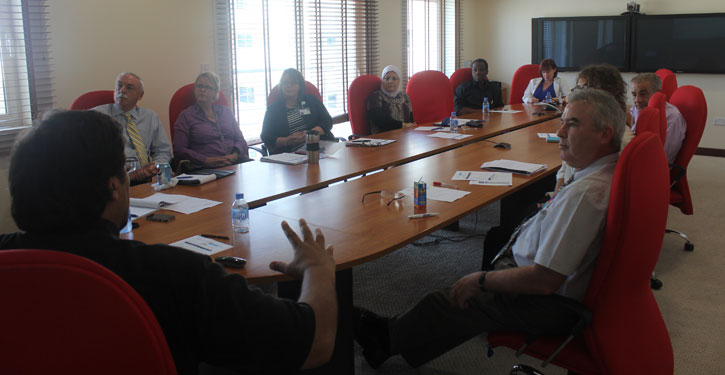
The Child and Adolescent Mental Health Task Force was established as a result of Qatar’s National Mental Health Strategy. The mandate of the task force is to build a service model that will develop a Child and Adolescent Mental Health Service for the country. The first priority was to identify all organizations in Qatar who were providing services to children and young people with mental health problems. We found silo working led to the duplication of services and fragmentation, which sometimes meant that some patients were not able to access and receive appropriate care.
To date, the task force membership has representatives from 18 different organizations across Qatar. The most challenging task was to develop an organizational and service structure with clear referral pathways and linkages between the various stakeholders. After initial brainstorming, the task force determined that the best way to achieve this would be through a framework of developing clinical guidelines, assessment and treatment protocols, and referral pathways for the most common diagnoses amongst children and adolescents. Dr. Umesh Jain, Consultant Psychiatrist from Hospital for Sick Children-Toronto, worked with the task force over multiple visits. The task force members were rearranged into working groups to ensure delineation of roles and responsibilities, and according to the service niche of the various stakeholders. The aim of this process was to develop sub-specialty, inter-professional, and multi-organizational clinical teams. The outcome was three-fold: the first was a proposed organizational and service structure centered on the sub-specialty teams; the second was the development of a common intake form centered on a coordinated intake system; and the third was the development of the resource booklet – a directory referencing the various organizations, their niche services, and point of contact. All these accomplishments fostered collegiality and encouraged increased communication.
The task force understood that a proposed organizational and service structure would not translate immediately to improving the quality of care currently provided within the inpatient psychiatric units. A small and dedicated working group focused on ways to meet international standards of best care practice. Ms. Elizabeth Ferguson, Ms. Najwa Al Shammasi and Ms. Joanne Bignell, from The Hospital for Sick Children Toronto, conducted a needs assessment of the knowledge, practice, and protocols of the nursing staff when adolescents were admitted into the adult inpatient unit within Department of Psychiatry at HMC. Ms. Najwa and Ms. Joanne came to Doha to deliver a one-week intensive education/training up-skilling course, which was reinforced with one-week of clinical consolidation on the adult inpatient units involved with the care of adolescent patients. The up-skilling course was well received by 30 participants and feedback has been very positive. All the participants were eager to learn how to better care for the patients and excited to be provided with tools to make a change.
Another over-arching priority area for the task force was to create a physical and team identity for the service, not just limited to HMC. The first initiative is the establishment of a villa compound for use by the sub-specialty, inter-professional and multi-organizational teams as a base for community-level care – outpatient services and day programs. The second initiative is acquiring dedicated space and beds, within HMC, to be used as a male adolescent inpatient ward. For both initiatives, visiting SMEs from the Hospital for Sick Children-Toronto have provided input regarding service model, structural changes, staffing model and requirements. Though not operational yet, this is a promising step forward, highlighting the task force’s commitment of providing quality care, comparable to international standards for mental health, to the children and adolescents of Qatar.
The memberships’ continued involvement, contribution, participation, and collaboration is the root of all the accomplishments. The task force is pleased with the progress made during 2012 but everyone involved knows the long road ahead to instituting impacting and sustainable change. The task force had its 2nd Annual Stakeholders’ Workshop in December 2012 (details of which are provided in the 'Events Wrap-Up' section). It was a great success and influenced identification of priority areas for 2013.
